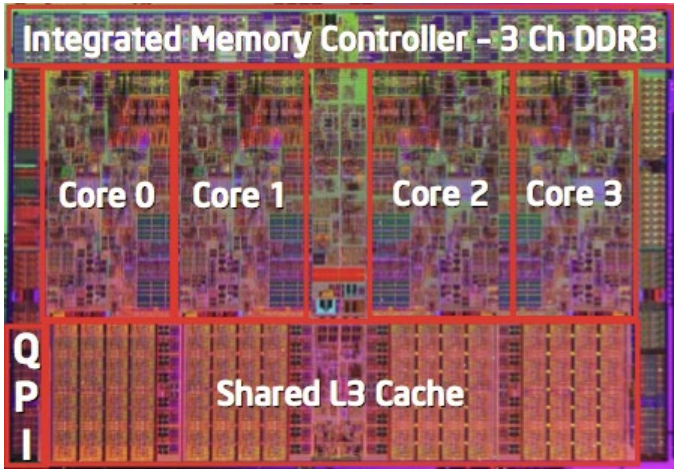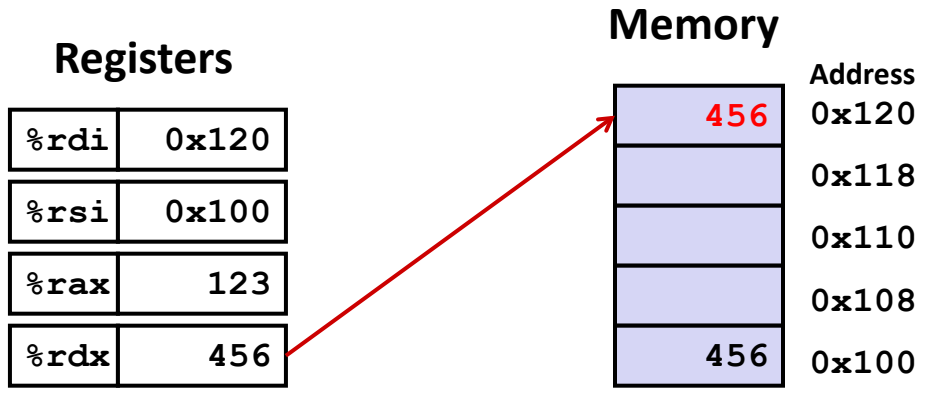Machine-Level Programming I: Basics 🖥️¶
约 587 个字 40 行代码 2 张图片 预计阅读时间 3 分钟 共被读过 次
15-213/14-513/15-513: Introduction to Computer Systems
3rd Lecture, Sept 3, 2024
Pre-Class Setup 🛠️¶
Login to a Shark machine and run:
wget http://www.cs.cmu.edu/~213/activities/gdb-and-assembly.pdf
wget http://www.cs.cmu.edu/~213/activities/gdb-and-assembly.tar
tar xf gdb-and-assembly.tar
cd gdb-and-assembly
Announcements 📢¶
- Lab 0 due today at midnight (no grace days).
- If lab takes >10 hours, consider dropping or studying C intensively.
- Submit via Autolab.
- Lab 1 (DataLab) due Tue, Sept 10.
- Lab 2 (Bomb Lab) released Thu, Sept 5; due Thu, Sept 19.
- Written Assignment 1 out Wed, Sept 4 (via Canvas); due Wed, Sept 11.
- Bootcamp 2 (Debugging & GDB) on Sun, Sept 8 (details on Piazza).
Today’s Topics 📌¶
- History of Intel processors and architectures (CSAPP 3.1)
- Assembly Basics: Registers, operands,
mov(CSAPP 3.3-3.4) - Arithmetic & logical operations (CSAPP 3.5)
- C, assembly, machine code (CSAPP 3.2)
Intel x86 Processors 🏭¶
Key Features:¶
- Dominates laptop/desktop/server markets.
- CISC (Complex Instruction Set Computer):
- Thousands of instructions with varied formats.
- Only a subset used in Linux programs.
- Evolutionary design: Backward compatible since 1978 (8086).
- Recent shift to x86-64 (64-bit architecture).
Comparison with RISC:¶
| CISC (x86) | RISC (ARM, RISC-V) |
|---|---|
| Many instructions | Fewer instructions |
| Variable formats | Fixed formats |
| Complex hardware | Simpler hardware |
| Legacy support | Modern low-power focus |
Intel x86 Evolution Timeline 🕰️¶
Milestones:¶
| Name | Year | Transistors | Clock (MHz) | Key Contribution |
|---|---|---|---|---|
| 8086 | 1978 | 29K | 5-10 | First 16-bit CPU, 1MB address space |
| 386 | 1985 | 275K | 16-33 | First 32-bit (IA32), flat addressing |
| Pentium 4E | 2004 | 125M | 2800-3800 | First 64-bit (x86-64) |
| Core 2 | 2006 | 291M | 1060-3333 | First multi-core |
| Core i7 | 2008 | 731M | 1600-4400 | Quad-core (Shark machines) |
x86-64 Integer Registers 🧮¶
16 General-Purpose Registers:¶
| 64-bit | 32-bit | 16-bit | 8-bit | Purpose |
|---|---|---|---|---|
%rax | %eax | %ax | %al | Return value |
%rbx | %ebx | %bx | %bl | Callee-saved |
%rcx | %ecx | %cx | %cl | 4th argument |
%rdx | %edx | %dx | %dl | 3rd argument |
%rsp | %esp | %sp | - | Stack pointer |
%rbp | %ebp | %bp | - | Base pointer |
| ... | ... | ... | ... | ... |
Note: %rsp is reserved for stack operations.
Assembly Operations ⚙️¶
Data Movement:¶
movq Source, Dest
- Operand Types:
- Immediate: $0x400, $-533 (constant values).
- Register: %rax, %r13.
- Memory: (%rax) (dereference address in %rax).
Examples:
| Instruction | C Equivalent |
|----------------------|---------------------|
| movq $0x4, %rax | temp = 0x4; |
| movq %rax, (%rdx) | *p = temp; |
| movq 8(%rbp), %rdx | temp = *(p + 8); |
Rule: No memory-to-memory transfers in one instruction!
Swap Function Example 🔄¶
C Code:¶
Assembly Implementation:¶
swap:
movq (%rdi), %rax # t0 = *xp
movq (%rsi), %rdx # t1 = *yp
movq %rdx, (%rdi) # *xp = t1
movq %rax, (%rsi) # *yp = t0
ret
Step-by-Step Execution:¶
- Load
*xpinto%rax. - Load
*ypinto%rdx. - Store
%rdxinto*xp. - Store
%raxinto*yp.
Addressing Modes 🗺️¶
General Form: D(Rb, Ri, S)¶
- Address =
Rb + S * Ri + D D: Displacement (1, 2, or 4 bytes).Rb: Base register.Ri: Index register (not%rsp).S: Scale (1, 2, 4, 8).
Examples:
| Expression | Computation | Address (Hex) |
|----------------------|----------------------------|---------------|
| 0x8(%rdx) | 0xf000 + 0x8 | 0xf008 |
| (%rdx, %rcx, 4) | 0xf000 + 4*0x100 | 0xf400 |
| 0x80(,%rdx,2) | 2*0xf000 + 0x80 | 0x1e080 |
Arithmetic Operations ➕➖¶
Two-Operand Instructions:¶
| Instruction | Effect | Example |
|---|---|---|
addq S,D | D = D + S | addq %rax, %rbx |
subq S,D | D = D - S | subq $4, %rsp |
imulq S,D | D = D * S | imulq %rcx, %rdx |
salq S,D | D = D << S | salq $3, %rax |
One-Operand Instructions:¶
| Instruction | Effect | Example |
|---|---|---|
incq D | D = D + 1 | incq %rdi |
negq D | D = -D | negq %rax |
Compiling C to Assembly 🔄¶
Example: Arithmetic Expression¶
C Code:
long arith(long x, long y, long z) {
long t1 = x + y;
long t2 = z + t1;
long t3 = x + 4;
long t4 = y * 48;
long t5 = t3 + t4;
return t2 * t5;
}
Compiled Assembly:
arith:
leaq (%rdi,%rsi), %rax # t1 = x + y
addq %rdx, %rax # t2 = z + t1
leaq (%rsi,%rsi,2), %rdx
salq $4, %rdx # t4 = y * 48
leaq 4(%rdi,%rdx), %rcx # t5 = x + 4 + t4
imulq %rcx, %rax # return t2 * t5
ret
Key Instructions:
- leaq: Compute address without memory access.
- salq: Shift left for multiplication by 16 (y*48 = y*3*16).
Disassembling Object Code 🔍¶
Example: sumstore Function¶
Object Code (Hex):
Disassembled Output:
0000000000400595 <sumstore>:
400595: 53 push %rbx
400596: 48 89 d3 mov %rdx,%rbx
400599: e8 f2 ff ff ff callq 400590 <plus>
40059e: 48 89 03 mov %rax,(%rbx)
4005a1: 5b pop %rbx
4005a2: c3 retq
Steps:
1. Push %rbx to save it.
2. Move argument z (%rdx) to %rbx.
3. Call plus function.
4. Store result (%rax) into *dest (%rbx).
5. Restore %rbx and return.
Key Takeaways 🎯¶
- x86-64 Architecture: Evolutionary design with CISC legacy.
- Registers & Memory: 16 GP registers; memory addressed via modes like
D(Rb,Ri,S). - Assembly Basics:
mov, arithmetic, and control flow instructions. - Compilation Pipeline: C → Assembly → Object Code → Executable.
- Debugging Tools:
objdumpand GDB for disassembly.

